xy
How to succeed
A presentation for the Rail User's National Conference
Ely, Cambridgeshire, Saturday 3rd November 2007
Written by Graham Ellis - "Save the Train" Campaign, Wiltshire
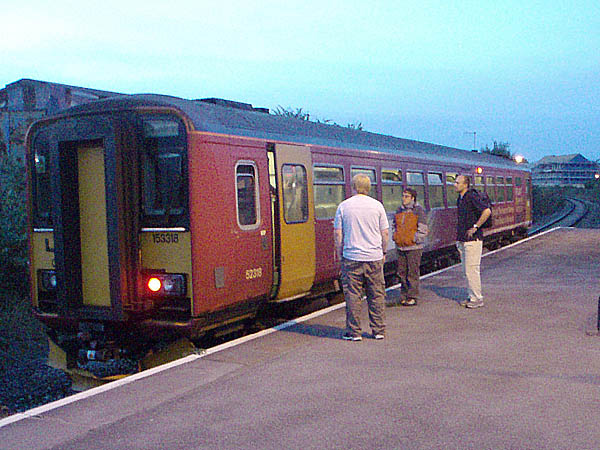
I once went on a sale training course and came back saying "it's obvious". But although many of the things were obvious, that wasn't the case until they had been pointed out to me.
I'm going to tell you a bit about our campaign to regain and retain an appropriate train service linking the five largest population centres of Wiltshire, then go on to detail some of the approaches and philospohies. I confess that I do feel a bit of a fraud presenting on how to be a successful campaigner since we have yet to achieve our main stated goals. But I can point to some intermediate acheievements, and transforming a case which was described to me as a no-hoper - "if you can acheieve this, you can acheive anything" into a case which has a good chance of achieving an appropriate service from December 2007.
xy
Geography
The Route, the traffic from North to South in Wiltshire

Ruth Kelly and the Department for Transport has just published (30th October 2007) their report entitled "Towards a Sustainable Transport System: Supporting Economic Growth in a Low Carbon World", and I took a look at some of its 90 pages. Page 27 includes a diagram showing road conjestion, and I've reproduced a zoomed section here.
* Roads shown in red cause an annual total loss of up to 139000 hours per km
* Roads shown in Orange cause an annual loss of between 6500 and 28000 hours
* And roads shown in blue cause a loss of under 6500 hours per km per annum.
(There are no roads on this section with a loss of over 139000 hours per km.)
You can see the major North - South traffic flows at the Western end of my map - a fairly clear run up from Salisbury to Warminster, but the two severely overloaded road routes from that area via Bath to the M4 (that's to the left) and via Chippenham to the M4 (that's to the right).
The towns of Swindon, Chippenham, Melksham, Trowbridge, Westbury and Warminster - and Salisbury and Frome too - are slated for major growth with up to 50% more homes in the next 20 years.
I undertstand that an agreement bewteen Wiltshire County Council and BaNES (Bath and North East Somerset) will route additional traffic via the right hand leg to relieve the left hand leg once the section at Westbury has been bypassed.
Would you like to see how the passenger railway along this corridor fits onto the map?
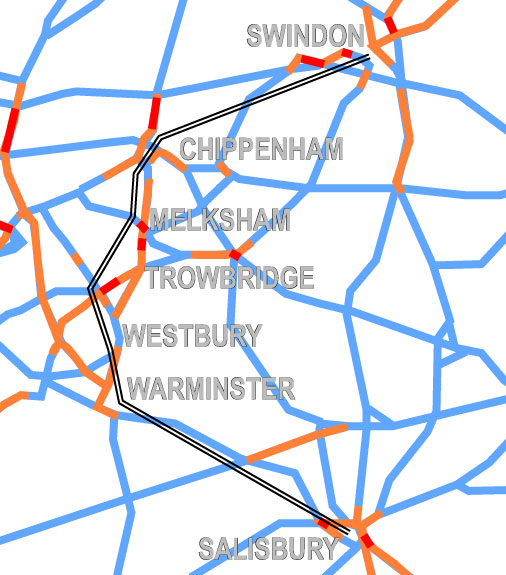
On that map I have also added the place names - the largest five population centres in Wiltshire (Swindon, Salisbury, Trowbridge, Chippenham and Melksham), and the other two large towns inthe county on the roads concerned - Westbury and Warminster.
I note especially the conjestion indicators for the road past Westbury, and past Melksham. Remember that there are strong proposals to provide a bypass at Westbury at the moment, but that plans for a relief road around Melksham were dropped from the 10 year plan. The current proposal for a new Asda store would join directly on to the red section at Melksham.
xy
History - BF (Before First)
The five largest population centres in Wilshire are Swindon, Salisbury, Trowbridge, Chippenham and Melksham and they are linked by the "TransWilts" train service.
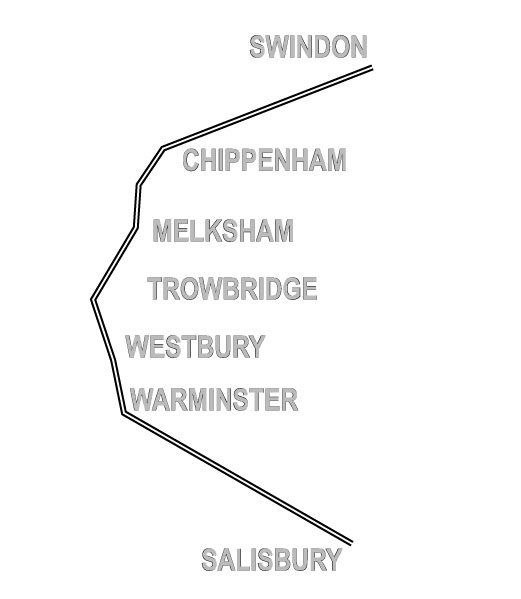
In 2001, there were major changes to the service on this line, giving us five trains each way a day running from Swindon through the other towns an on to Southampton.
From 2002 to 2006, service use grew substantially. When asked for figures for the line as a whole, the Office of the Rail Regulator quotes ticket sales for Melksham, a town of 24000 served only by there trains where the number of journey tickets rose from 3200 to 27400 in 5 years - that's a compound grown rate of 35%. Other measures (from Wiltshire County Council and later from the First Group gave more modest growth rates of 10% for the line as a whole.
The 2002/03 figures were used to prepare sevice level requirements for 2007 assumed a growth rate of less than 1%. Consultations closed in late Spring 2005, and were so limited in publicity that they didn't come to attention of the users of the service or the local communities served.
The conclusion reached by a stunted consultation, and a growth forecast of 1% based on 3000 tickets was rather less favourable that the conclusion that would have been reached with double figure growth from 27000 tickets. And indeed the decision should have been for an even more dramatic improvement as the whole corridor is slated for 50% growth in housing in the next 20 years. "Bus alternatives?" I hear you ask. Nah - the road system sucks. The train from the county town - Trowbridge - to Swindon takes 35 minutes but the "Express" bus takes 95.
xy
History - AW (After Wessex)
Current train service are even worse we envisaged under the FGW franchise.
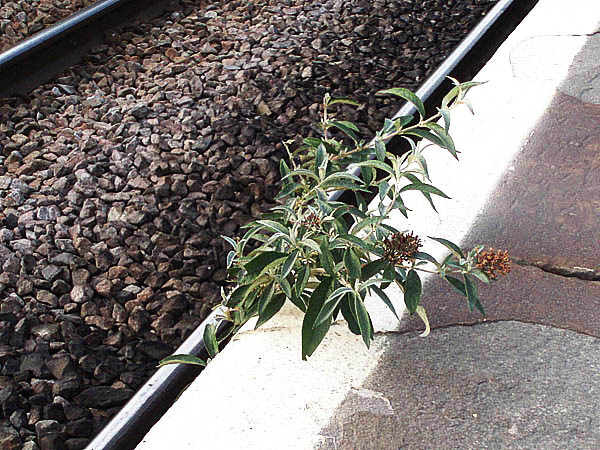
The specification called for a commuter train into Swindon, arriving there after 8 a.m and leaving back sometime after 5.30 p.m., plus one other trip each way every day. Those "clever" people at First, though, noticed that if they run the morning train before the specification time, and leave the evening train until nearly 7 p.m., they can save themselves the leasing cost of a unit. The extra trains can be run at about 6 in the morning, and 8 in the evening, as balancing workings. It does nothing practical for travellers on the route, it doesn't even meet the minimum spec (never mind - the spec mysteriously changed) but it's great for shareholders.
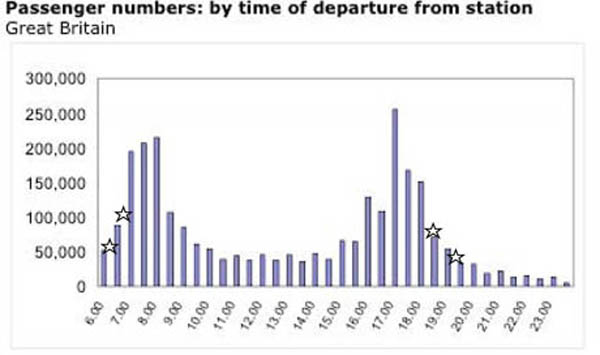
Use of trains across the UK, 2006. Passenger numbers by start time
TransWilts trains shown with Asterisk markers.
Saturday - "two trains each way" and some are sensible, but why oh why was the popular 17:45 shoppers and sports fans train (which for passenger's purposed was balanced by the Saturdays only 09:30 inbound) and replace it with a train that doesn's start until nearly 9 p.m.
And on a Sunday - "two each way" we were told, but the spec changed into "two trains from Westbury to Swindon" in the end. Complete mystery as to who thinks the Sunday traffic is one-way and is late evening (20:20 and 22:20 into Swindon)
Reliability was an issue in Wessex trains days - I don't have any cancellation figures prior to 2005, but we always had mobile phones with us. Summer of 2006 wasn't brilliant, but First Great Western assured us that when they cut the trains that December we would see a big change in reliability. HOW RIGHT THEY WERE! Cancellations rocketed, with up to 40% of trains cancelled in a two week period in January 2007. Even now as I write this at the end of October 2007, 10% of weekday trains were cancelled the week before last, and 10% so far this week have been cancelled too.
We don't monitor weekend trains to the same degree, but historically they have been replaced by buses for engineering reasons on the majority of the weekends. That's not only because of direct engineering works, but also because the line is a major diversionary route and trains linking the hamlets (in London terms) of Chippenham, Melksham, Trowbridge, Westbury and Warminster - total population over 100,000 are withdrawn when they might delay the Plymouth Express that thunders through without bothering to stop.
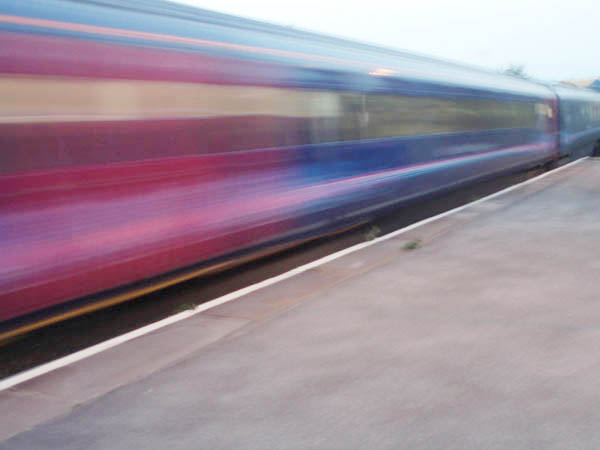
xy
Lies, Damned lies and stastics
"Swindon-Southampton service discontinued (apart from 1 service in each peak the services were, on average, less than 25% loaded i.e. less than 20 people on each train). The peak services between Westbury and Swindon (calling at Trowbridge, Melksham and Chippenham) will remain." We was lied to - the peak service does NOT remain. The morning service has been replaced by one the best part of an hour earlier, and the eveing service by one that's over an hour later.
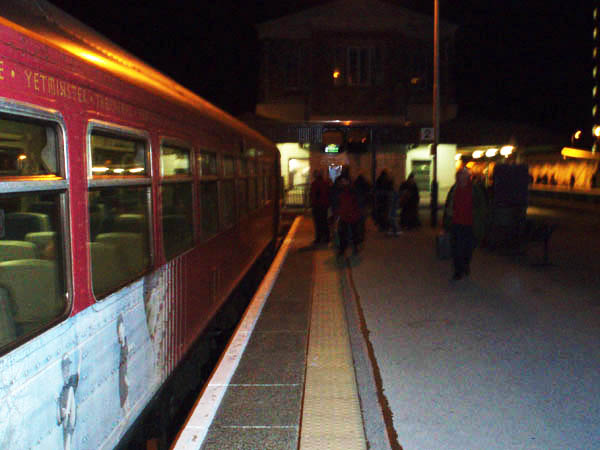
Overall? I would estimate that of 64 services scheduled each week in the published timetable, an average of around 40 to 45 run - that depends on the period you take to look at. August 2 years ago, perhaps 25% ran. And THAT is a part of the period that's been used in so many statistics I've had quoted at me.
xy
Save the Train
* Origins
Founded - August 2005. A Web site, as a result of seeing a letter in the local paper which said "do you realise you have missed the consultation for 2007 train services".
We didn't realise. There were no signs at the station or on the trains. No press notices. And later on we discovered under Freedom of Information that the consultation on what services the new franchise should be provided had actually been run after the specification had been sent out, and that civil servants had discussed how to minimise the effects of the consultation. So I don't feel too guilty that we didn't realise.
* Objectives
1. To bring the case for an appropriate train service connection the five
major population centres of Wiltshire to the serious attention of those able to specify, finance and provide such a service.
2. To have the case seriously and fully evaluated in order to establish what an appropriate service actually comprises.
3. To work for the provision of such an appropriate service (includes service level, timing, pricing, reliability,booking arrangements, publicity, comfort)
4. To work for the retention of that service once achieved, and of any lesser service prior to that point both as at least some service to the curent customers, and as a stepping stone to the future.
* Organisation
"Save the Train" is largely internet / web based in its activities - the medium is an effective one, and many of the major protagonists are heavy users of that technology. But we are working closely with other groups towards common goals - in the local area there's the Melksham Railway Development Group and The West Wilts Rail Users Group. Further afield you have organisations such as Travel Watch South West (formerly SWPTUF) , the Campaign for Better Transport (formerly Transport 2000), Campaign against New Beeching Report, and RailFuture.
We have a loose committee, liaise through email, with occasional committee or public meetings. We're not hesitant about calling and publicising meetings, but have tried to resist the regular meeting trap. Activities are all low budget, so contributed by members. For example, I don't notice the 2 pounds a year that it costs to register our internet domain, which is hosted on a server that has spare capacity anyway. Members give their time freely; any time available is appreciated.
* Outcomes
First objective (known). When we came to the case, the TransWilts service was two sentences in the middle of 100 page SRA report covering Paddington to Pembroke Dock to Penzance. Now it (and the town of Melksham, served only by the line) are much better known.
Second Objective (looked at). From an initial reaction which verged on the "don't be silly and ask for more that 2 trains a day" we moved forward to a very serious proposal for 5 a day from this December - DfT, County Council and First all on board, as confirmed by FOI. And the County Council has concluded that an appropriate level of service would be hourly each way.
Third Objective (implemented). No. Not acheived. The detailed proposals that we were almost-promised ("just needs to be signed off by Network Rail") at a public meeting in May disappeared from the draft timetable from this coming December; reasons not totally clear to me.
Fourth Objective (retention and lesser goals). We strongly suspect that in August 2006 when the service was withdrawn for 10 days that it would have returned as a bus ... as per current precedents in Staffordshire and Watford. However, publicity and activities including a gathering of VIPs on the station before six in the morning resulted in the appearance of a smarter-than-normal service.
A new southbound service, operated on a commercial basis by First Great Western, starts early on a Sunday evening in December. It's just one train a week, but it's at a time that it plugs a real hole and it's significant in demonstrating goodwill and being commercial.
Train cancellations remain a serious issue (to the extent that First have installed a special bus stop labelled "Rail Replacement services" at Trowbridge station), but we're no longer in the same class as the 07:10 Bristol to Paddington which is cancelled on around 25% of the time.
Early Morning buses from Melksham, and evening buses back, now make calls at the railway station in Chippenham. After an unbelievably hard struggle, the bus stop at the station now carries the times of those buses. They are clearly used, judging by the complaints from Chippenham taxi drivers that fares to Melksham have dried up
xy
Tools
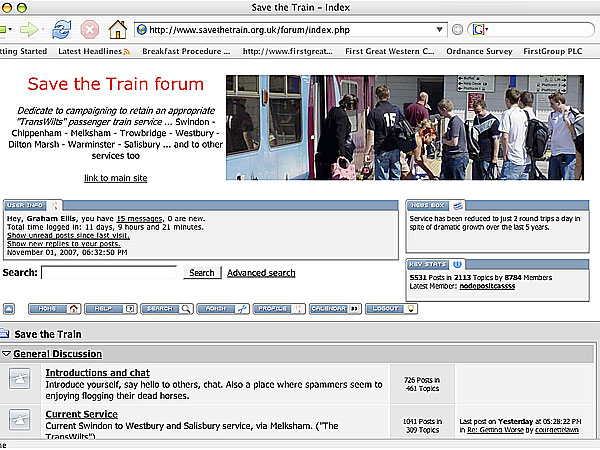
The Internet.
We've used the internet because it's a darned good tool and because it's a technology that many of our key members are in to. Other groups we work with are far less online and so we balance them to some extent.
We try to keep things far more interesting than flat pages - (I wish I could show you but we're ahead of the game as regards to conference centres - there's no access here)
* Forums - where anyone can discuss topics
* Blogs - diaries kept by individuals, including a FGW blog compendium
* Wiki - where a whole group of trusted editors can update information pages
* Live feeds - where we'll replay a history of the latest train running
* Email updates - for those who don't visit too often
* Emailing to key decision makers
* Emailing useful questions and cases to the TOC, DfT and others
Our sites (yes, more than one!) are carefully constructed so that people will find us when they're searching even if they didn't know our name. Search Google for "First Great Western" and we're on the top page. 1433 posts in 189 new topics in October alone, with dozens of new members.
Press
The local press are very much "on board" as indeed is the whole community - and good stories that are well argued, well written, well researched are attractive to a wider audience too.
Once one gets known as a specialist on the subject, and has a reliable contact point, the press will ask for further comment.
On board and rail based activities
* Special trips such as the Santa Special and Weymouth Excursion
* Riding the regular trains to talk with the regular users
* Talking with people waiting at the stations, offering lifts, etc
* Talking with crew (but only during their slack times)
* Taking a maximum of opportunities to count passengers / see trains through
Post
Not a lot of postal activity (email is far more immediate and lower cost) but we have send a number of "hard copy" documents out.
Events
* Stands Party in Park and WW Show
* Speaking at events such as here and Travel Watch South West
* Special outings - Swindon and Weymouth
* Spoke at the Enquiry in Pubolic into the Regional Spatial Strategy
And something different!
xy
Highlights
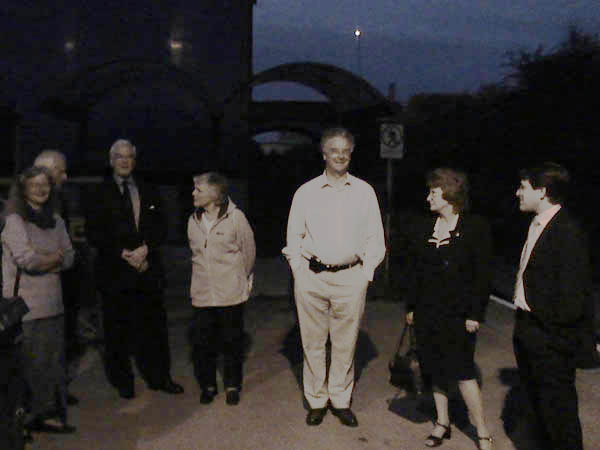
* Petition
We signed up for a petition to the Prime Minister calling for an appropriate level of service and got more signatures than any other dometic public transport issue up to that point.
* Petticoat
With the support of Jenny Aggutter who waved her red petticoat to save the train in "The Railway Children", we got Sunday Express publicity, and we got everyone at the Travel Watch South West meeting to wear red petticoats that were asking Alison Forster to Save Our Train when she came to spek there
* Predawn Raid
40 people, including Chamer of Commerce, Federation of Small Buisneeses, propective MPs, Count Council reps on the 05:56 from Melksham
* Party in Park
* Parliament and candidates
* Weymouth
* 30 people at our home
* Save the Train and FGW Fora
* Breakfast Meeting with directors
* Kiss and Ride morning
* TV and National Radio and press
* The value of a good researcher
xy
Upcoming
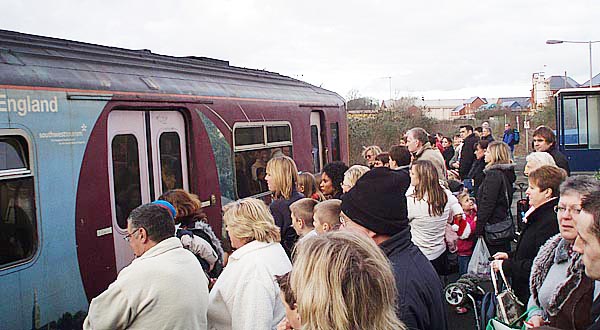
* The case presented to John Curley of FGW
* Labour party candidate for our new consituency
* Santa special
* The Wiltshire Travel Game
xy
Mantra
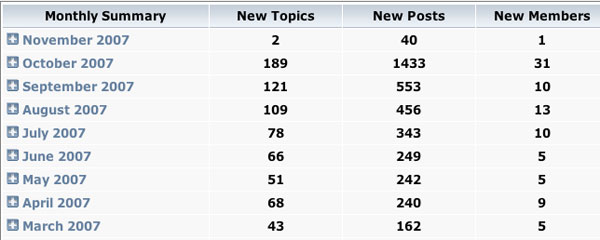
On knowing the case
* Have a superb case, but understand and admit any weaknesses
* Listen to and respect the experts
* Understand the case
* Understand statistics
* Answer all questions - an open debate
* Sound Bites
On working with people
* Right letter to right person
* Work with other groups
* Keep everyone on side
* Push on open doors not closed one
* Avoid Party politics
* Make your self easily available
* Respect Privacy
On reaching the right place
* Be pracical and flexible within your objectives
* Work within the system and don't try to change the system
* Look for new ways of doing things
* Be Persistant
* Beware campaign fatigue
* Positively celebrate small victories and honesty
* Not just Melksham
Some things to avoid
* Don't ask for too much
* Don't exadurate
* Don't knock other campaigns
* Don't be afraid to say "no"
* Don't be a Luddite
* Don't try to fix it for everyone
* Don't tell a railwayman how to plan or run a railway
* Don't be an anorak
* Don't waste people's time
And finally
* Always have a "where now"
xy
Where Now?
Thank you for listening everyone.
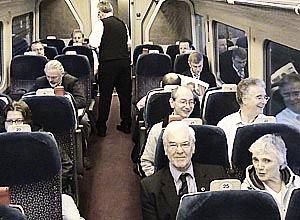
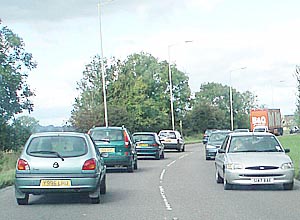
I understand that my Audience includes Mr Bob Breakwell, a non Executive Director of First Great Western. "And Finally" I would like to encourage Mr Breakwell, who has many years of experience of running train services along rapidly growing corridors such as ours, to offer his full support within the FGW board to our case for an appropriate train service as now defined by his Regional Managaer, County Council, and civil servants such as the Franchise Manager Peter West at the DfT.
To any of you who live within the First Great Western area, can I ask that you visit our forum and post at least once - there are sheets available with the URL for you to take away, and the more strenght of numbers and experts we have to had so that we can work with FGW to make things work for the passengers as well as the government and their shareholders, the better.
See http://www.firstgreatwestern.info/coffeeshop/
For everyone, please visit our "Save the Train" web site. You'll find TransWilts information a'plenty - also the full draft of this. And you'll find a "Greater Britain" board too where topics updated in the last 2 days include PWQs, Kelly calls for Transport debate, Midland Mainline strikes, impacts of passenger numbers on underground services, Glasgow Airport and the Port of Liverpool freight link.
See http://www.savethetrain.org.uk/forum/index.php
Graham Ellis,
Save the Train
404, The Spa, Melksham, Wiltshire, SN12 6QL
graham@wellho.net
1st November 2007
This page - http://www.savethetrain.org.uk/national/ho2.html
More detailed report - http://www.savethetrain.org.uk/national/ho1.html
Full presentation - http://www.savethetrain.org.uk/national/index.html













